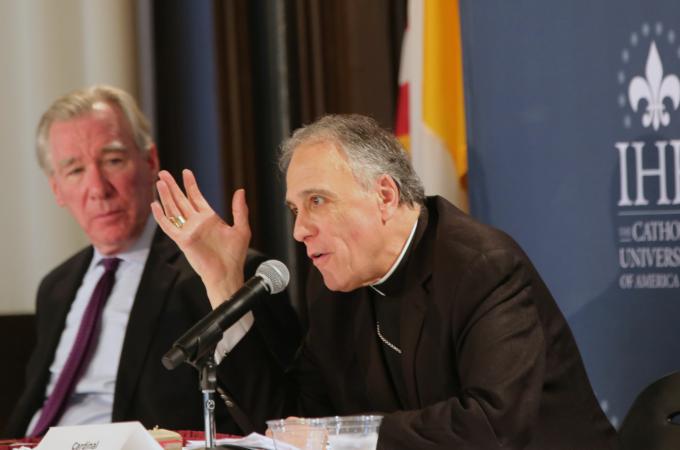Where is the Spirit leading us?
In the midst of the current crisis in our church -- with a once-admired cardinal accused of heinous acts, bishops widely judged incapable of policing themselves, investigators poring through church archives and ordinary Catholics in fits of anger and despair -- Cardinal Daniel N. DiNardo of Galveston-Houston, president of the U.S. bishops' conference, asked a very brave question recently. Where might the Holy Spirit be leading us? What possible good could the Spirit bring forth from all this darkness and despair?
Cardinal DiNardo reflected on this question in a talk at The Catholic University of America Feb. 6. The occasion was a conference called "Healing the Breach of Trust." It is part of an initiative by the university to reflect on the lessons learned in the most recent iteration of the sexual abuse crisis, with a special focus on the role of laity.
Cardinal DiNardo said the current crisis is being used by the Spirit "to open the church -- sometimes with great force -- to a fuller understanding of ecclesiology," that is, the structure of the church, "that began over a half century ago."
This may be a "new ecclesial season," Cardinal DiNardo said, invoking a phrase from Pope Francis, who told the bishops at the start of their January retreat that "a new ecclesial season needs bishops who can teach others how to discern God's presence in the history of his people, and not (be) mere administrators."
The cardinal seems to be suggesting that the Second Vatican Council, an epochal event in the history of the modern church but already 50 years old, may just now be having its moment. Indeed, despite all the changes and their attendant controversies and debates, it may only be now that Catholics are truly grappling with what the council was proposing.
This is a provocative thought. Perhaps Vatican II was not just the culmination of a century of theological and pastoral reflection about the church, the world and its people, but was in fact preparing Catholics for something unsuspected at the time.
Cardinal DiNardo quotes Pope Francis again, who told the bishops that this "new ecclesial season" may require "a new approach to management, but also a change in our mindset ... our way of praying, our handling of power and money, our exercise or authority, and our way of relating to one another and to the world around us."
For the cardinal, this will demand of bishops humility, repentance and conversion. It may also mean that "bishops will have to learn new ways to share and delegate their administrative duties." Vatican II called the bishops to be not just administrators, but shepherds, not just corporate executives, but pastors.
What this "new ecclesial season" will look like is not yet clear. The cardinal looks to the Acts of the Apostles and wonders if "a theology of delegation" that would allow for a wider role for the laity but one that doesn't, at the same time, minimize the authority of a bishop.
The cardinal's speech suggests that the current conversation about bishop accountability and the abuse crisis itself is only the start of something that may be much bigger. If so, the trajectory of the past century in the life of the church suggests that is not just an opportunity but a challenge for the laity.
If we are to assume more responsibility for the mission and administration of the church, then we must make a greater commitment to our own formation and how we witness our faith to the world. None of this works if bishops, priests and laity are not in it together and for the long haul.
- Greg Erlandson is director and editor-in-chief of Catholic News Service.



















